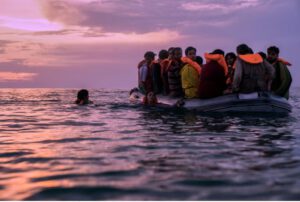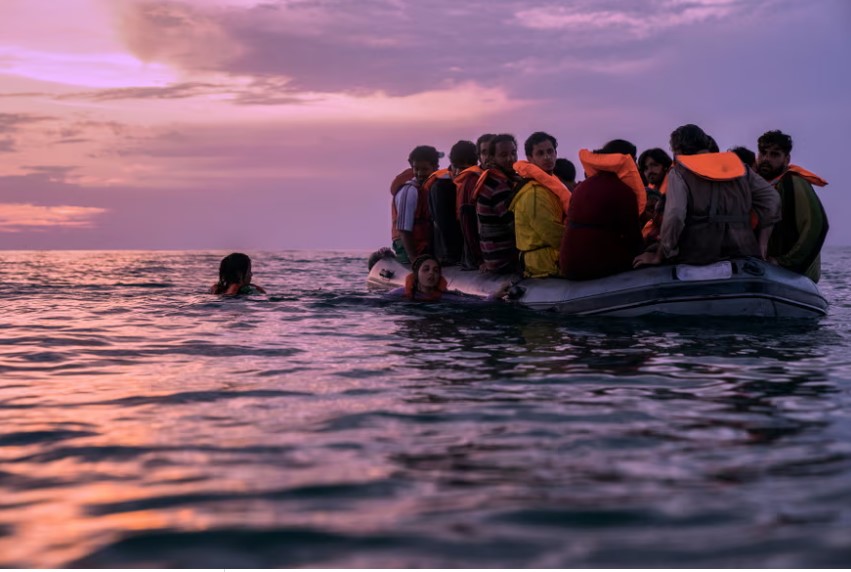Movie Info
Movie Info
- Director
- Sally El Hosaini
- Run Time
- 2 hours and 15 minutes
- Rating
- PG-13
VP Content Ratings
- Violence
- 3/10
- Language
- 1/10
- Sex & Nudity
- 2/10
- Star Rating
Relevant Quotes
Save me, O God,
for the waters have come up to my neck.
Then the king will say to those at his right hand, ‘Come, you who are blessed by my Father, inherit the kingdom prepared for you from the foundation of the world, for I was hungry and you gave me food, I was thirsty and you gave me something to drink, I was a stranger and you welcomed me, I was naked and you gave me clothing, I was sick and you took care of me, I was in prison and you visited me.

Had they been Jews or Christians, the Psalmist’s prayer might have been that of two refugee sisters, Sara (Manal Issa) and Yusra (Nathalie Issa) Marsini who found themselves in waters literally “up to my neck.” I first read about them in Jaz O’Hara’s dramatic book Asylum Speakers* which mentioned this film about them. I love it that the two actors who play Yusra and Sara in British filmmaker Sally El Hosaini’s exciting film are also sisters! If you enjoy the sports genre, in which we root for the underdog—see The Hill reviewed in last month’s VP—you will adore this one in which two teenage girls will introduce you to the horrors faced by the millions of Syrians who were forced to flee their war-torn nation and risk the dangerous waters of the Aegean Sea.
The film begins in 2011 in a suburb of Damascus, Syria, where the girls are more like American teenagers than the stereotypical burqa-wearing females most of us associate with the Middle East—they are Moslems, but both wear the tight jeans and blouses preferred in our own communities. They have the freedom to hang out with their peers, and they dance to Western popular music. They are different from their peers in that their father, a swimmer in his younger years but prevented by compulsory military service from becoming an Olympic swimmer, has transferred his dreams to Sara and Yusra. With her father as coach to both, it is especially Yusra who is enthusiastic about becoming an Olympic swimmer. The more outgoing Sara would rather spend time with her friends than to rise so early in the morning for swim training. At a birthday party their father Ezzat (Ali Suliman) shows he is different from other Muslim fathers by telling how proud he is to be the father of three daughters of such strong character.
When the civil war grows ever more furious in 2016, the girls will need every fiber of their strength. At first life goes on as usual in the suburb, with the flashes and roar of canons seen and heard on the distant horizon. Then as the strife comes closer, some of their friends are killed. One day at a swimming meet, a plane flies over, dropping bombs. One of them crashes through the large windows and splashes into the pool in which Yusra and her competitors become terrified of their impending fate. In slow motion we see the bomb sinking to the bottom and—turns out to be a dud.
Now the talk about leaving the country turns serious. For various reasons the parents and their younger sister cannot leave, so it is decided that the sisters must flee in the company of their slightly older cousin Nizar (Ahmed Malek) who has been a DJ at the various dances that the girls attended. Their plan is to fly to Istanbul and take an overland rout to Germany where the older Sara had friends. Their plan, is once there, Yusra, being seventeen, will apply for a family reunion and thus bring the rest of the family to them.
The three do make it to Turkey, but once there Nasir learns how dangerous—and such a time-consuming walk—it is to pass through Bulgaria–so he accepts an offer to join a group traveling by boat to the Greek island of Lesbos. Yusra reminds them of their father’s warning not to take a boat because so many have drowned, but she is overruled. While waiting for the smuggler to lead them to the boat, they bond with their companions. It is truly an international group, from such far away places as Afghanistan, Eritrea, Somalia and the Sudan. Each person is suffering from the horror of cruel warfare. One of them, Shadra (Nahel Tzegai), is a mother carrying her baby.
To their disappointment, the refugees find the boat is a rubber dinghy that has been patched several times. The smuggler spends about a minute showing one of them how to operate the motor, and then he leaves them after pushing off the overloaded dinghy. Their disappointment turns to terror as the little boat bobs up and down in the swells of the Aegaeon Sea The motor sputters, stops, and then has to be started again, and again and then stops altogether. Quick-witted Sara asks who can swim, and when just a few indicate they can, asks them to pair up with a non-swimmer so they can offer help if the raft should sink. The sun sets, and the waves become higher, plus the patches leak, allowing water to seep into the boat. They frantically throw all their possessions overboard, Yusra reluctantly tossing her bag of swimming medals. Still the boat continues to sink, even though everyone is frantically bailing water with their hands.
Realizing they need to lighten the weight further, Sara stands up, cuts the rope around the gunwales and using it as a tether, jumps overboard. When she sees her sister about to follow, she orders her to stay in the boat, but Yusra insists on joining her. This saves the dinghy from sinking, and when the motor starts up again, they manage to reach Lesbos the next day. In an unforgettable shot that reminds us of the immensity of the Syrian Refugee crisis, the little party trudge through piles of orange life jackets dropped along the beach by previous refugees. A high overhead shot discloses a veritable sea of life jackets stretching on either side of the travelers as far as the eye can see! (About 5.3 million Syrian refugees live in neighboring countries. An estimated 2500 have drowned attempting the to cross either to Grece or to Italy.)
The bedraggled survivors walk to the edge of the town where they spot a restaurant, but the owner will not sell them any water, even when they assure him, they can pay. Other townsfolk close their windows or whisk their children inside and shut their doors when they spy the procession of ragged refugees. Fortunately, they come upon a UNICEF station where their needs are kindly met. Deciding to press on toward the border with Hungry, they are cheated by a man promising to transport them by truck. He is but one of many who take advantage of gullible refugees or express a hostile attitude toward them—even in Germany whose leader Angela Markel had sought to set the tone for her countrymen by welcoming those whom so many others regarded as dangerous intruders. In one harrowing scene at a garage in Hungary we see that rape is a real threat to the women. Thankfully, amidst so much deceit and cruelty there are also people of grace. They discover a bus sent by caregivers will take them to their German destination. Fearing another scam, Yusra is very reluctant to get on, but eventually the three of them do, winding up in a large camp housed in a giant warehouse. It is crowded but safe.
How Yusra almost misses out on her Olympic dream because of her reluctance to being labeled a refugee, I will leave for you to discover. Also, there are more disappointments, some dealing with government bureaucracy when the sisters discover that by the time her papers are processed, Yusra will be too old to qualify for the family reunion program. But there are also people who come to care about the refugees, especially the kind Sven who becomes Usra’s coach and champion.
The film deals the most with Yusra’s athletic dream (and it’s no spoiler to disclose that she achieves it in an unexpected, and at first unwanted, way—there would be no movie otherwise), but Sara’s coming to realize what she wanted to do with her life is actually just as important, even inspiring. She finds a vocation greater even than her sister’s original dream by returning to Lesbos and working with the group that ministered to them, the International Rescue Committee. In fact, as we learn from the film’s end cards, she becomes so involved with aiding refugees that the Greek government sees her as a threat to its hardline policy of turning back refugees that it has arrested her and plans to try her as a criminal. Another example of the cynical saying, “No good deed goes unpunished”?
The beautiful cinematography by Christopher Ross places us right in the midst of the action, especially in the dinghy episode. I couldn’t help but think of the contrast of the characters in this film with those of two recent films, My Big Fat Greek Wedding 3 and Two Tickets to Greece—how privileged the women are in the latter two films compared to the sisters and companions who almost lose their lives in their “cruise” and live packed together in a refugee camp rather than in posh resorts or villas.
The acting is superb—the two sister actors are a real discovery—and to ensure authenticity many of the actors in the boat are refugees themselves. So is the film’s associate producer, Hassan Akkad, a filmmaker—who himself survived a similar refugee journey from Syria.
As I have written about other social justice films, this one puts a human face onto the headlines and statistics. It says to those who scrawl such hateful slogans onto the walls of buildings “Refugees, Go Home!” that there is no going back for millions of desperate people fleeing from war or gangs or starvation. Though we Americans are focused upon our border with Mexico, the plight of refugees is world-wide. I highly recommend this film for discussion by social justice advocates wanting to engage others in arriving at a fuller understanding of this world-wide problem.
*See my review of this wonderful book elsewhere i tnis issue.
This review will be in the Sept. issue of VP along with a set of questions for reflection and/or discussion. If you have found reviews on this site helpful, please consider purchasing a subscription or individual issue in The Store.

